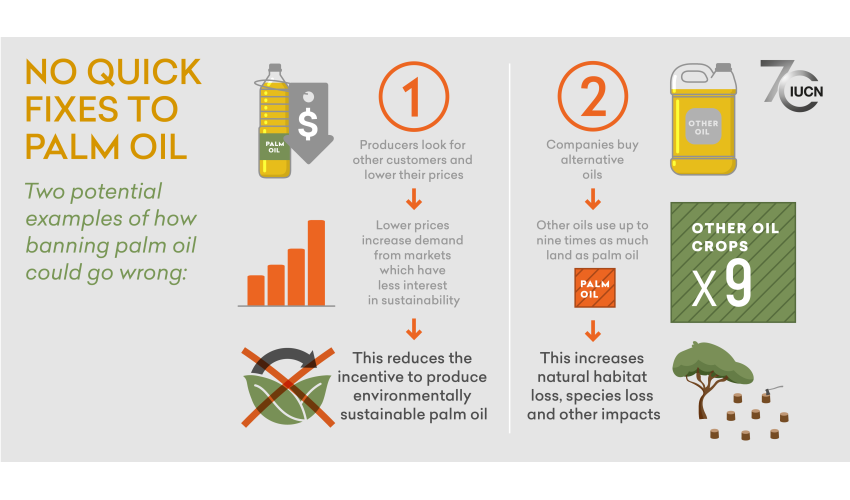Yes, buying sustainable palm oil helps to support the farmers that are producing palm oil in a sustainable way. More than 47 conservation organizations, including WWF and the Jane Goodall Institute, advocate the production and purchase of sustainable palm oil. Sustainably produced palm oil helps to protect the environment. Palm oil is important for meeting the globally rising demand for food and there is increasing evidence that, when it is produced sustainably, palm oil is also contributing to preserving ecosystems. Palm oil produced in a sustainable and a future-proof manner can actually contribute to resolving the issues at hand and as such provide a sustainable and future proof supply of vegetable oils for all. So, yes!
What can consumers do?
Palm oil is an incredibly productive crop with yields topping any other vegetable oil. Research shows that when palm oil is produced sustainably, with zero deforestation, the plantations can be a positive element in the local agroecological system, even attracting wildlife. The environment, workers’ rights, and the land rights of local people are all protected and livelihoods improved. However, unsustainable agricultural production of various crops can exacerbate climate change, destroy ecosystems, and endanger wildlife. They can also cause conflicts over land ownership and erode workers’ rights. So, while unsustainable production can have widespread negative impacts, sustainable production can be part of the solution. So, sustainable palm oil is not a myth! For the main reasoning why researchers, conservation organisations, and NGOs are convinced it is better to choose sustainable palm oil rather than to ban palm oil products, please check.
A boycott of palm oil is often spoken of as a solution to combat deforestation and the destruction of rainforest. But did you know that more than 47 conservation organizations, including WWF and the Jane Goodall Institute do not support a blanket boycott? Instead, these organizations advocate the production of sustainable palm oil. These organisations say:
“Boycotting palm oil is a legitimate expression of consumers’ social and environmental concerns, but the question we urge individuals and businesses to ask themselves is: Will this action help wildlife, forests and communities? The problem with a blanket boycott is that it punishes indiscriminately. It removes the market for palm oil from those companies which are making genuine efforts and progress towards sustainability, as well as those which aren’t. And if we remove the market for sustainable palm oil, we also remove the incentive for companies to abide by the better management practices which reduce the footprint of the industry – in terms of impacts on wildlife, forests, climate and human rights.”
Oil palms supply 35% of the global demand for vegetable oil on just 10% of the world’s land under oil crop cultivation. Producing the same amount of an alternative oil such as soybean or sunflower oil would require five to ten times more land and further increase pressure on natural habitats. Oil palms require smaller amounts of pesticides and fertilisers than other vegetable oil crops such as soybeans. Replacing oil palms with other vegetable oil crops would increase demand for land and further jeopardize biodiversity and increase greenhouse gas emissions.
